What is the most anticipated 3-day water fight in Thailand? Songkran Festival! Songkran Festival 2025 is celebrated from April 13 to 15. You may be more familiar with it by its other name, the Thailand Water Festival. This article tells you how and where to celebrate the big festival and more. You can expect modern activities and traditional customs of the Thailand Songkran Festival now.
What is Songkran Festival?
Songkran Festival, also called the Thai Water Festival, is a festival to celebrate the traditional Thai New Year. Songkran Festival in Thailand is the most lively and grand festival of the year. In 2023, Thailand's Songkran Festival was listed as a World Cultural Heritage Site by UNESCO.
When is Songkran Festival 2025?
The Songkran Thailand Water Festival is held annually from April 13th to 15th in the Gregorian calendar. Normally, this is the end of the dry season in Thailand and the beginning of the rainy season. Although the Songkran holiday officially lasts for three days, the celebration of the Songkran Day Festival may sometimes start earlier or be extended in Chiang Mai, Pattaya, and other places. If you want to immerse yourself in Thai culture, April 13th to 15th is the best time to visit Thailand for Thai New Year 2025.
The 3 days of Songkran Festival
Day 1 (April 13th): The first day of Songkran Festiva is called Maha Songkran which refers to the last day of the old year. Today is also National Elderly Day. This is the most important day and the beginning of the celebration.
Day 2 (April 14th): This day is called Wan Nao. Today will change from the old year to the new year. The second day is also known as National Family Day when Thai people spend the day with their family.
Day 3 (April 15th): Today is Wan Thaloeng Sok, the beginning of the new year. Bathing Buddha occurs today.
How to Celebrate Songkran Festival?
1. Songkran Water Fight
Water is the key element of this festival. The water fight is the most famous and popular event during the Songkran Festival in Thailand. During the festival, streets, alleys, and temple squares become a battlefield of water. Regardless of gender or age, enthusiastic people will use water guns, buckets, and pipes to splash water on each other. At this time, the streets are closed to traffic, leaving only people to indulge in revelry.
Elephants also take part in splashing water during the Songkran Festival. They will use their long noses to absorb water and spray it onto the crowd, adding a joyful atmosphere to the festival.
In Thai culture, splashing water symbolizes washing away the misfortunes, grime, and sins of the past year and welcoming the good fortune and cleanliness of the new year. April is the hottest month of the year in Thailand, but the cool water can calm you down! Songkran 2025 is the most unique experience you can't miss when visiting Thailand in April.
2. Spring Cleaning
In order to welcome the coming year with a new look, it is traditional for Thais to thoroughly clean houses, temples, and other places on the first day of Songkran. Thai people believe that a clean and dirt-free home can bring them good luck and prosperity in the new year.
3. Songkran Religious Activities
Songkran Festival is a Buddhist festival accompanied by many religious activities.
Visit temples: During the Songkran Festival, Thai people visit temples and offer traditional food and flowers. Temple visits also include praying for good luck in the coming year.
Bath Buddha images: Bathing the Buddha images is a tradition in Thailand's Songkran. People use fragrant water to clean the images of Buddha, expressing their respect for the Buddha and praying for the blessings for the safety and happiness of their families.
Merit-making activities: People will donate items such as food, clothing, and daily necessities to the temple for the use of monks. This is an act of virtue in Buddhism. Believers will also listen to monks preach in temples.
Buddha parade: The procession of Buddha images during the Songkran Festival is an important event in Thai Buddhist culture. Before the parade, the Buddha images will be cleaned and decorated with flowers and gold and silver ornaments. Gorgeously decorated parade floats carry Buddha images through the streets. During the parade, people splash water on the Buddha images on the float and bathe it.
Build sand pagodas: During the Songkran Festival, people would build sand pagodas in temples and decorate them with beautiful flowers, joss sticks, candles, colorful flags, etc.
4. Pay Respect to Elders
Rod Nam Dam Hua ritual is an important traditional custom during the Thailand Songkran Festival. In this ceremony, the young people gently pour the scented water onto the hands or shoulders of the family elders, accompanied by bowing and prayer. This ceremony is mainly a way to show respect and gratitude to the elders and ask for their blessings.
5. Songkran Music Festivals
To experience the uplifting vibe of Songkran, there are a variety of music festivals, cultural performances, and parties besides water fights, such as the S2O Music Festival and Siam Songkran Music Festival. Pop singers, rock bands, DJs, and other music performances allow you to enjoy a night of festive revelry. Visitors can also enjoy traditional performances like folk plays, and classical Thai dance.
6. Release Birds and Fish
Releasing animals is virtuous in Buddhism, which shows people's respect for life. During the Songkran Festival, Thai people will buy birds, fish, and other animals to return to nature, so as to accumulate good karma and get good luck.
Where to Celebrate Songkran Festival?
1. Bangkok
Join the intense and fun water battle in Bangkok, the capital of Thailand. Bangkok is known for big water fights and thousands of people gather to celebrate the Songkran Festival. Choose a lively area, such as Silom Road, Khao San Road, or Siam Square. Join the water-splashing crowd in the deafening music and accept the "attack" from various water-splashing devices.
Silom Road is a culinary heaven in Bangkok. When you are tired of water fights, you can also eat Thai snacks and Songkran food, such as Khao Chae (soaked rice), Thai green curry, Thai fish cakes, Prawn Pad Thai (stir-fried noodles with shrimp), Pad Kee Mao Talay (Thai drunken noodles with seafood), Mango Sticky Rice and Nam Ma-Toom (bael fruit tea).
On Siam Songkran Music Festival, Spaceplus Songkran Festival, or S2O Music Festival, you can sway your body to the rhythm of the music. Nightclubs also hold concerts and electronic music parties, accompanied by various flashing neon lights.
2. Chiang Mai
Chiang Mai is one of the most popular destinations for the Songkran Water Festival. You can participate in the most authentic Songkran traditional ceremony here and feel the strongest festive atmosphere. There is no better place to experience the Songkran Festival culture than Chiang Mai!
The Old City Moat, a hub of water splashing and cultural performances, takes your Songkran experience to the next level. At Thapae Gate, you can see parades, beauty contests, and intense water battles. Nimmanhaemin Road is also one of the best places for activities.
Chiang Mai has many temples where you can experience the traditional culture of the Thailand Water Festival, such as Wat Phra Singh and Wat Chedi Luang. Buddhist activities like temple worship are carried out here. You can spend some time visiting these temples. Do as the Thai people do by pouring water into the images of Buddha and praying for the new year.
3. Ayutthaya
Ayutthaya also held a big celebration. Ayutthaya is an archaeological ruin in Thailand and a UNESCO heritage site. You can visit ancient temples and ruins. During the Songkran Festival, it became a huge battlefield for water fights.
The elephant is the official animal in Thailand, which means strength and intelligence. You can celebrate the Thai Songkran Festival with elephants in Ayutthaya and receive blessings from elephants. At the Songkran Festival, Thai people will paint colorful patterns on elephants, including flowers, hearts, and words. Splashing with elephants makes the Songkran festival in Ayutthaya unique.
4. Pattaya
Pattaya is a famous coastal city in Thailand. Pattaya offers vibrant water battles, allowing other revelers to splash water and bless each other. You can immerse yourself in the Songkran Festival at Wat Phra Yai (Big Buddha Temple) in Pattaya. You can expect traditional rituals and spirited water fights. After pouring water on the Big Buddha, you can appreciate the beautiful murals and gardens in the temple.
Water fights on Beach Road and Walking Street can give you an exciting atmosphere. Foam parties, DJ performances, and live music are also not to be missed. Unlike other cities in Thailand, the Songkran Festival in Pattaya lasts a full week. You can also experience the Songkran Festival with an additional holiday, the Wan Lai Festival.
5. Phuket
April in Phuket is hot, but the cool water is refreshing. Patong Beach and Bangla Road are filled with DJ music, dance competitions, and large parties. Witness a beautiful parade in Phuket Town and taste mouth-watering street food at the Songkran food festival.
In addition to participating in the Songkran Festival, you can also explore the scenic beaches and islands of Phuket. April is also a great time to dive in Phuket because of the ideal weather, calm seas, and excellent underwater visibility.
History and Origin of Songkran Festival
It is said that the Songkran Festival originated from the Hindu spring festival, which marks the arrival of the new year and the new harvest season in ancient India.
The Thai word "Songkran" is derived from the Sanskrit word "saṅkrānti". It means "to move", "movement" or "astrological passage". Songkran in Thailand refers to the sun moving from Pisces to Aries in the zodiac. Aries constellation is the first sign of the Zodiac, so the Songkran Festival marks the beginning of the Thai New Year.
Who Celebrates Songkran?
In addition to Thailand, some countries also celebrate this festival with some regional variations and different names. In Yunnan province in China, the Dai ethnic minority calls it Poshui Jie (Water-Sprinkling Festival). In Cambodia, local people celebrate Khmer New Year or Chaul Chnam Thmey while the festival in Myanmar is known as Thingyan. In Laos, the festival is called Pbeemai or Pi Mai.
Useful Tips for Celebrating Songkran Festival
1. Pack for Songkran Water Festival
A water gun or any water splashing device, waterproof goggles, waterproof phone pouches, quick-dry clothes, waterproof and non-slip shoes, extra clothes that you can change after water fights, waterproof sunscreen or hat/cap…
2. Book Hotels and Vehicle in Advance
Public transport and hotels can be booked up months in advance, so it is advisable to book as early as possible.
3. Songkran Festival Ettiquite
Do not splash water without the consent of others, as some people may not want to participate.
It is disrespectful to splash water on monks, the elderly, pregnant women, kids, or babies.
Do not use ice or dirty water, but only clean water.
4. Dress Code for Water Fights
You can wear brightly-colored clothes or traditional Thai clothing like the locals.
Wear lightweight, quick-drying clothing to dry quickly after splashing.
Durable and non-slip shoes prevent slipping on wet and slippery roads.
Avoid wearing overly revealing or inappropriate clothing, especially in and around temples.
Don't wear white or light-colored clothes.
5. Safety First
Use safe water fight equipment and avoid high-pressure water guns.
Remember to replenish water and sunscreen.
Avoid throwing water into other people's eyes and ears.
Protect personal belongings and avoid carrying valuable items.
Do not splash water on the vehicle drivers, as this can easily cause an accident.
Wear a helmet when riding a motorcycle.
Alcohol is common during a big festival, but don't overdo it. Many public designated water fight venues are alcohol-free according to law.
After participating in a water fight, shower in time to avoid getting infected by unclean water.
6. Say Common Songkran Festival Phrases
Songkran sa-wat-dee (สงกรานต์สวัสดี) – Happy Songkran!
Sawatdee pi mai (สวัสดีปีใหม่) – Happy New Year!
Chok dee na (โชคดีนะ) – Good luck!

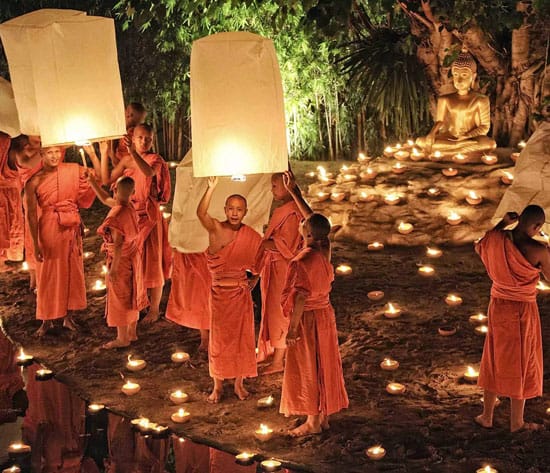
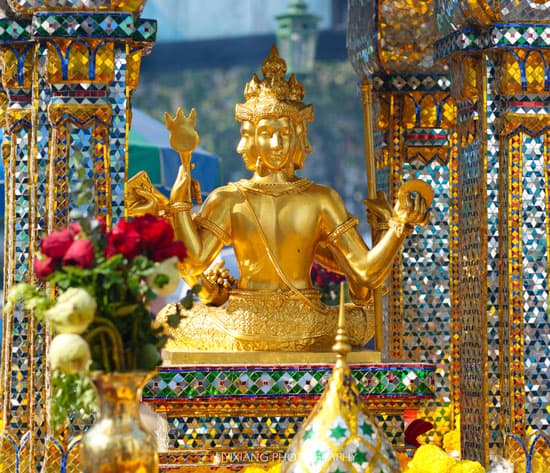
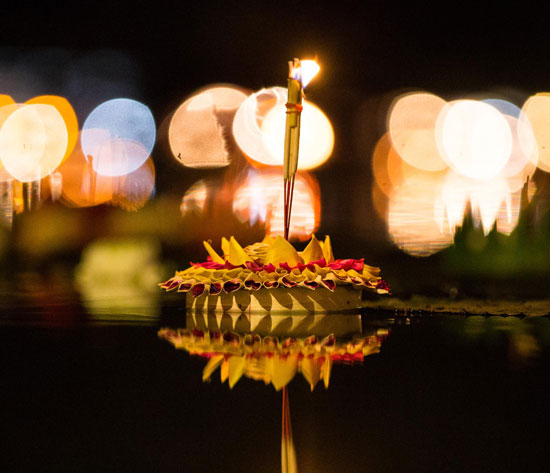
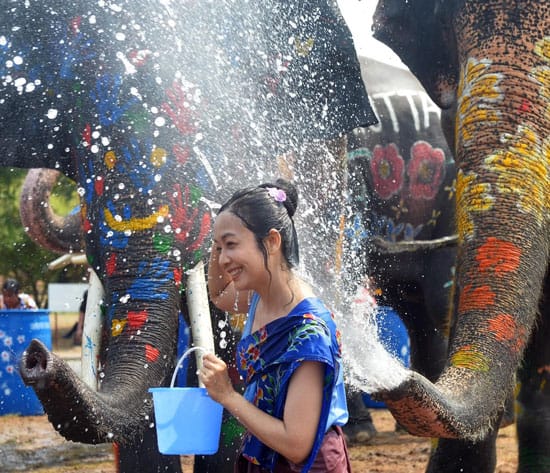
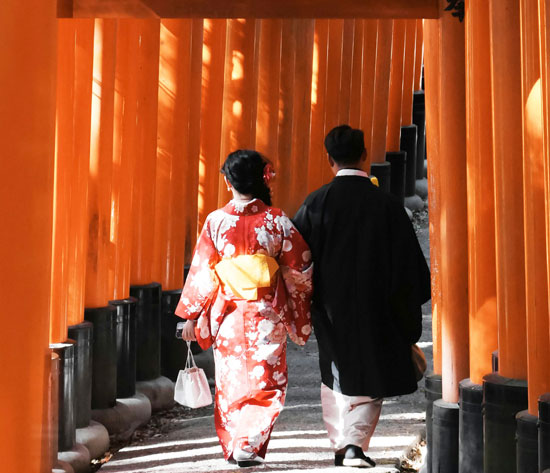
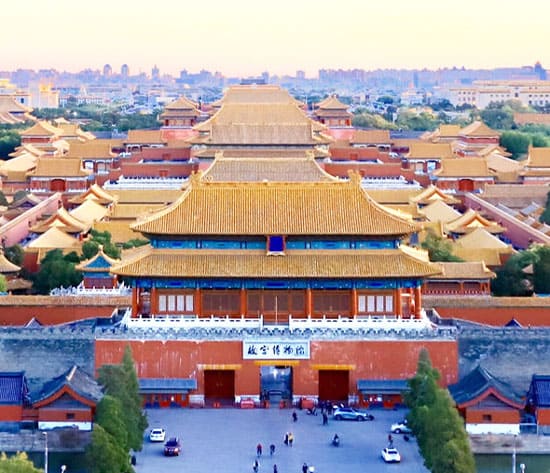
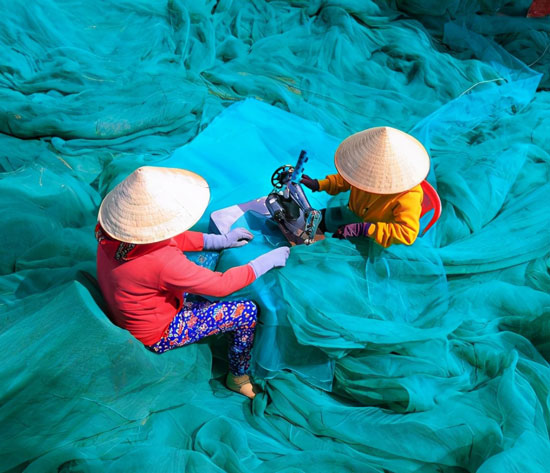
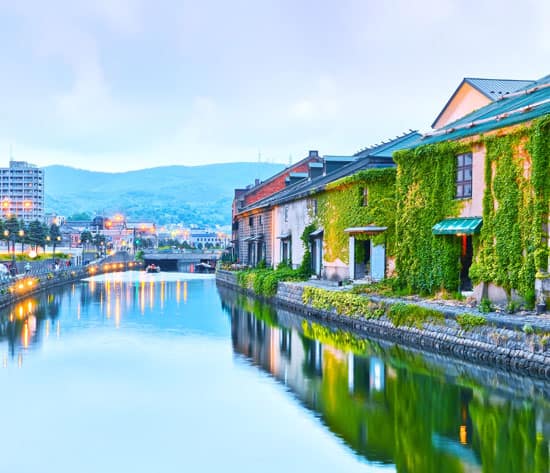
Have a Question?
You might see your comment appear on this page, but your email address and full name will not be published. Your personal information will remain confidential. Our Asia travel experts will get back to you as soon as possible. Required fields are marked *